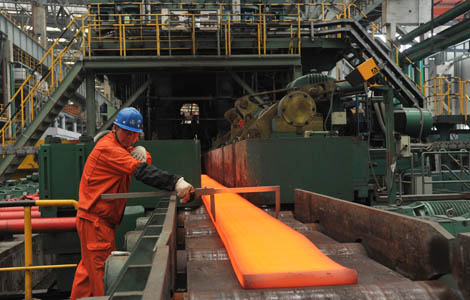Regulators draw up QDII2 rules
Updated: 2013-07-27 10:27
By Cai Xiao (China Daily)
|
||||||||
The China Securities Regulatory Commission said on Friday that it is "actively cooperating" with the central bank to formulate regulations governing the planned qualified domestic individual investor program, also known as QDII2.
A detailed timetable will be released later, according to a CSRC spokesman.
"In order to protect the interests of small and medium-sized investors, we are sorting out policies, working mechanisms and the implementation effects," the spokesman said.
A specific guideline to stabilize capital flows was issued by the central government earlier this month.
The government said at the time that China will support the pilot program, which will allow individual investors to inject funds into foreign capital markets.
The People's Bank of China is allowing Guangzhou and Shenzhen, in Guangdong province, to set up the first QDII2 pilot programs. The bank is waiting for final approval from the State Council, according to Wang Jingwu, president of the central bank's Guangzhou branch.
The authorities may initially allow individual investors to buy securities listed in Hong Kong, followed by other financial products in the Hong Kong market and, eventually, products in other parts of the world, according to a document obtained by the Shanghai Securities News.
"Qualified" domestic individual investors are defined as those having at least three years of experience in stock investment and financial assets equivalent to at least 1.5 million yuan ($244,000), according to the document.
Only institutional investors now can invest in overseas capital markets, via the qualified domestic institutional investor program, known as QDII1.
Residents of Hong Kong, Macao and Taiwan who work on the Chinese mainland are being encouraged to invest in the A-share market, said the CSRC spokesman.
A-share accounts started being opened for such residents on April 1. As of July 21, there were 29,815 accounts. About 91 percent of them were in Shanghai and the provinces of Guangdong, Fujian and Jiangsu.
Of these accounts, 11,008 had conducted trades and 9,014 accounts were holding shares with a total market value of 4.16 billion yuan.

 Bolt wins 100m at London's Olympic Stadium
Bolt wins 100m at London's Olympic Stadium
 19 industries to shed capacity
19 industries to shed capacity
 Choir sings its way into Chinese hearts
Choir sings its way into Chinese hearts
 Hot times for travel agents
Hot times for travel agents
 Nursing home blaze kills 11 residents
Nursing home blaze kills 11 residents
 Wuhan a prime spot for international rowing hub
Wuhan a prime spot for international rowing hub
 LeBron frenzy grips Guangzhou
LeBron frenzy grips Guangzhou
 Police to question driver for Spanish train crash
Police to question driver for Spanish train crash
Most Viewed
Editor's Picks

|

|

|

|

|

|
Today's Top News
CIC gets 10.6% yield for overseas assets
Arrival of China tigers put on hold
Deadly NE China fire an act of arson: police
Chinese developer buys LA site for $1b project
Snowden faces another 6 months in limbo: official
Sovereign fund sees 10.6% return
Hot times for travel agents
19 industries to shed capacity
US Weekly

|

|







